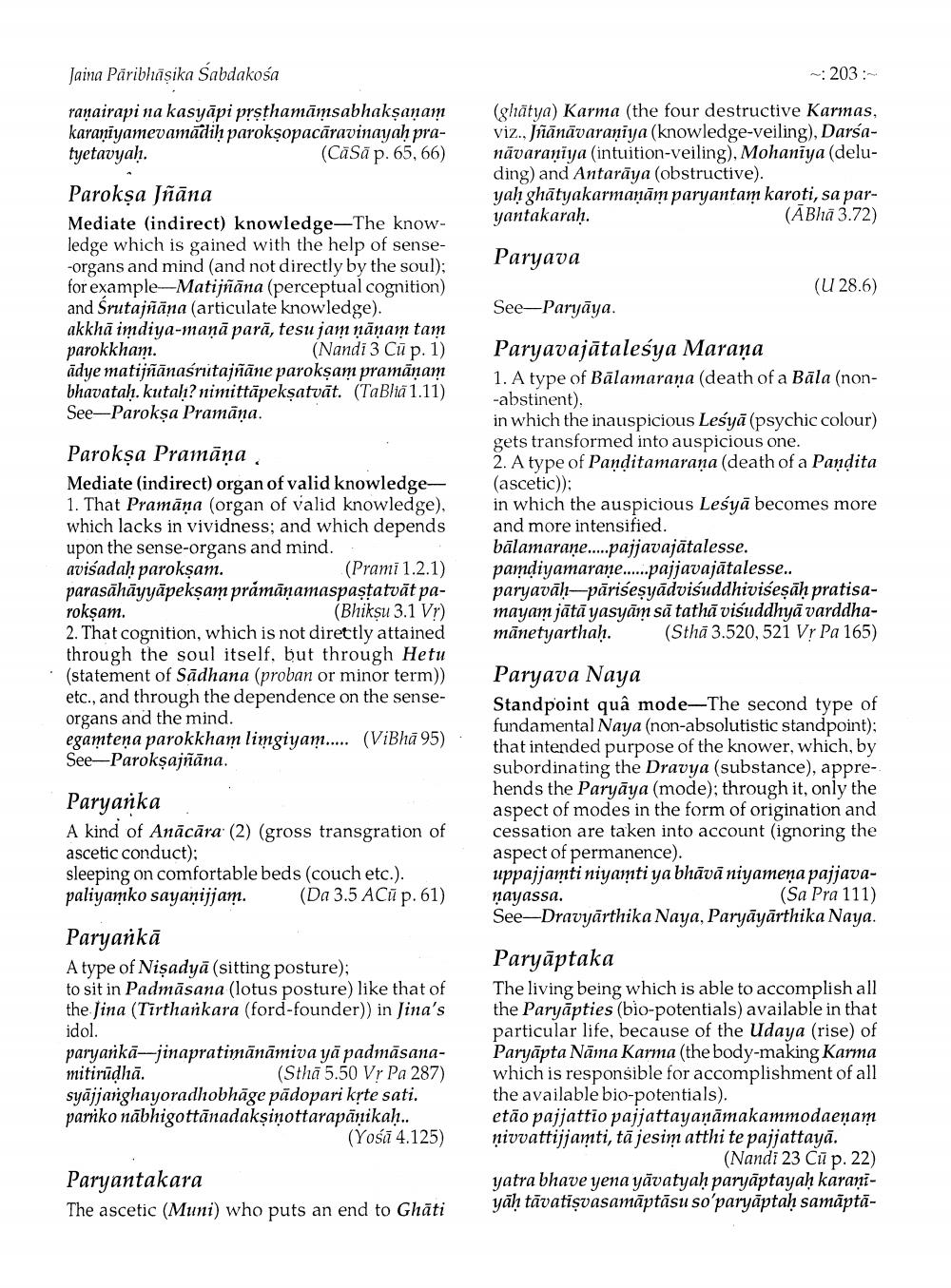________________
Jaina Păribhāṣika Sabdakosa
- 203
ranairapi na kasyāpi prsthamāmsabhakşanam karaṇīyamevamādih paroksopacāravinayah pratyetavyaḥ
(CaSāp. 65, 66)
(ghātya) Karma (the four destructive Karmas, viz., Jñānāvaraṇīya (knowledge-veiling), Darsanāvaraniya (intuition-veiling), Mohaniya (deluding) and Antarāya (obstructive). yah ghātyakarmanām paryantam karoti, sa paryantakarah.
(ABhā 3.72)
Paryava
(U 28.6)
Parokşa Jñāna Mediate (indirect) knowledge-The knowledge which is gained with the help of sense-organs and mind (and not directly by the soul); for example-Matijñāna (perceptual cognition) and Srutajñāna (articulate knowledge). akkhā imdiya-maņā parā, tesu jam ņāņam tam parokkham.
(Nandi 3 Cū p. 1) ädye matijñānasritajñāne parokşam pramāņam bhavatah. kutah? nimittāpeksatvāt. (TaBliá 1.11) See-Paroksa Pramāņa.
See-Paryāya.
Parokya Pramāņa Mediate (indirect) organ of valid knowledge1. That Pramāna (organ of valid knowledge), which lacks in vividness; and which depends upon the sense-organs and mind. avisadah parokşam.
(Prami 1.2.1) parasāhāyyāpekşam prámānamaspastatvāt parokşam.
(Bhiksu 3.1 Vr) 2. That cognition, which is not direttly attained through the soul itself, but through Hetu (statement of Sadhana (proban or minor term)) etc., and through the dependence on the senseorgans and the mind. egamteņa parokkham limgiyam..... (ViBhä 95). See-Parokyajñāna.
Paryavajātaleśya Maraña 1. A type of Bālamaraña (death of a Bāla (non-abstinent), in which the inauspicious Leśyā (psychic colour) gets transformed into auspicious one. 2. A type of Panditamarana (death of a Pandita (ascetic)); in which the auspicious Lesyā becomes more and more intensified. bālamarane...pajjavajātalesse. pamdiyamarane......pajjavajātalesse.. paryavāh-pāriseșyādviśuddhiviseșāh pratisamayam jātā yasyām sā tathā visuddhyā varddhamānetyarthaḥ. (Sthā 3.520,521 Vr Pa 165)
Paryarka A kind of Anācāra (2) (gross transgration of ascetic conduct); sleeping on comfortable beds (couch etc.). paliyamko sayanijjam. (Da 3.5 ACū p. 61)
Paryava Naya Standpoint quâ mode—The second type of fundamental Naya (non-absolutistic standpoint); that intended purpose of the knower, which, by subordinating the Dravya (substance), apprehends the Paryāya (mode); through it, only the aspect of modes in the form of origination and cessation are taken into account (ignoring the aspect of permanence). uppajjamti niyamti ya bhāvā niyamena pajjavaņayassa.
(Sa Pra 111) See-Dravyārthika Naya, Paryāyārthika Naya.
Paryankā A type of Nişadyā (sitting posture); to sit in Padmāsana (lotus posture) like that of the Jina (Tirthankara (ford-founder)) in Jina's idol. paryarikā--jinapratimānāmiva yā padmāsanamitirudhā.
(Sthā 5.50 Vr Pa 287) syājjarghayoradhobhāge pädopari krte sati. parnko nābhigottānadakşiņottarapāņikaḥ..
(Yośā 4.125)
Paryāptaka The living being which is able to accomplish all the Paryāpties (bio-potentials) available in that particular life, because of the Udaya (rise) of Paryāpta Nāma Karma (the body-making Karma which is responsible for accomplishment of all the available bio-potentials). etão pajjattio pajjattayaņāmakammodaenam ņivvattijjamti, tā jesim atthi te pajjattayā.
(Nandi 23 Cī p. 22) yatra bhave yena yāvatyah paryāptayaḥ karaniyā tāvatisvasamāptāsu so'paryāptaḥ samāptā
Paryantakara The ascetic (Muni) who puts an end to Ghāti




